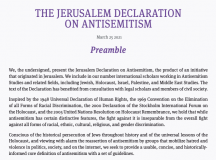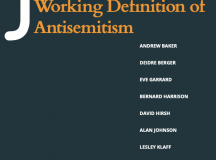Derek Penslar is William Lee Frost Professor of Jewish History at Harvard University and Resident Faculty at the Minda de Gunzburg Center for European Studies. He responds here to Cary Nelson’s essay ‘Accommodating the New Antisemitism: A Critique of the ‘Jerusalem Declaration,’ published last week in Fathom. We invite further contributions to this discussion.
I share Cary Nelson’s concerns about rising antisemitism and about how hostility to Jews and Israel can be intertwined. It is precisely because of these concerns that I support the Jerusalem Declaration on Antisemitism (JDA).
In recent years, the International Holocaust Remembrance Alliance (IHRA) definition of antisemitism has been enshrined in policy and law by universities, civic organisations, and governments. This is bizarre, as the IHRA definition was developed for the purpose of data collection, not policy making, and its authors acknowledged its protean status. (It was called a ‘working’ definition.) Nonetheless, this definition has been invoked in efforts to restrict the free and open exchange of ideas beyond the necessity to protect public safety and prohibit discrimination and harassment. The most recent and absurd such attempt has occurred just now, at Temple University in Philadelphia and Stockton University in New Jersey, where a co-sponsored Zoom event on the misuse of the IHRA has encountered protest that such an event is itself antisemitic, ‘abhorrent,’ and an ‘abomination.’
I have long had reservations about the IHRA definition. Its sections on the nature of antisemitism lack clarity, and its judgment of critical discourse about Israel assumes guilt rather than innocence. There are a great many people in the world who bear no animus against Jews but who are troubled by Israel’s treatment of Palestinians and want it to change. Such critics include Jews who are deeply attached to Zionism as an ideal and Israel as the fulfillment of that ideal.
Of particular concern is the IHRA’s association of antisemitism with a ‘double standard’ towards Israel. Of course there are countries that behave worse than Israel, but are we only allowed to criticise the most heinous regimes in the world? Don’t humans have a right to choose the communities and causes that matter to them most? And, given Israel’s location in territory sacred to more than half of humanity, does it not stand to reason that Israel’s actions will be highly visible, and hence particularly subject to scrutiny?
The IHRA definition’s limitations have been made clear to me in work I have done in Canada as an expert witness in prosecutions for ‘willful promotion of hate,’ which is a criminal offense. The antisemitic discourse I have been asked to assess invariably contains references to Israel. I have found it difficult to invoke the IHRA definition because of its strong implication that highly critical but factually accurate statements about Israel are antisemitic. A clear distinction between conspiratorial fantasy and demonstrable reality, between unhinged and fact-based (even if intemperate) language about Israel, would make it easier for me to demonstrate the presence of the former, which is actionable, and to set aside the latter, which is not.
In this respect, the JDA has many advantages over the IHRA definition. It combines a clear definition of antisemitism with a discussion of forms of speech about Zionism and Israel that may be presumed to be antisemitic. It then moves on to speech about Israel that may be presumed to not be antisemitic. (About two-thirds of the document is about what antisemitism is, and the final third is about what it is not.)
The document’s final section is of far more than forensic value. It also makes an important contribution to the promotion of free speech within broad limits. The section asserts that support for forms of boycott against Israel, proposals for alternative political scenarios for the future of Israel and the Palestinians, and evidence-based criticism of Israel’s past or present actions are not, on the face of it, antisemitic.
I oppose the BDS movement for many reasons, but inherent antisemitism is not one of them.
A person who chooses not to buy Turkish figs, encourages their friends not to do so, and starts a campaign against the purchase of Turkish figs may be assumed to oppose the Turkish government but not to hate the Turkish people. Why, then, would we assume that someone who favours a boycott of Israeli goods hates Israeli Jews, not to mention Jews as a whole?
As to the alleged antisemitic valence of one-state or confederal approaches to the Israeli-Palestinian conflict, throughout the 140 year-long history of Zionism and Israel, actors within the Zionist movement and the international community have proposed many different forms of Jewish collective life within Eretz Israel. Borders and political arrangements between Jews and Arabs have been under constant discussion. Israel and the Palestinian territories are a welter of ill-fitting political elements – statehood and occupation, autonomy and settlement enclaves – that perpetuate oppression, resistance, and hatred. It is not inherently antisemitic to propose alternatives to the status quo.
I find it particularly strange that a well-grounded, evidence-based argument regarding Israel would be construed as antisemitic. Legitimate scholarship has demonstrated that Israel bears its share of responsibility for the creation of the Palestinian refugee problem in 1948 and for subsequent Arab-Israeli wars. Claiming that IDF soldiers harvest Palestinian organs is antisemitic; claiming that Israel denies West Bank Palestinians basic human rights is not.
For all of the reasons laid out above, I find the JDA to be an essential contribution to contemporary political debate. Its purpose is to decenter, not replace, the IHRA definition. The JDA is a thinking tool, not a policy instrument. Combating antisemitism should be part of a university’s or government’s general commitment to protect civil liberties and act against racism . Antisemitism today is deeply alarming, and Jews, like anyone else, must be protected from violence, abuse, harassment, and discrimination. Drawing clearer distinctions between factually-grounded critique of Israel and baleful fantasy about Jews will better equip us to take part in the common struggle against baseless hatred.





































Derek Penslar deserves many thanks (!) for his excellent explanation for why he signed the JDA and for his elegant defense of that document. It should be read by all who are interested in the ongoing problems of both antisemitism and the Israeli-Palestinian conflict as well as the debates about the “definitions.”
‘A person who chooses not to buy Turkish figs, encourages their friends not to do so, and starts a campaign against the purchase of Turkish figs may be assumed to oppose the Turkish government but not to hate the Turkish people. Why, then, would we assume that someone who favours a boycott of Israeli goods hates Israeli Jews, not to mention Jews as a whole?’
Because much of the anti-Israel discourse clearly shows that those who support BDS do hate Israeli Jews and label them ‘settler colonialists’, and when they label Israel an ‘apartheid state’ or ‘guilty of genocide’ they are not merely opposing the Israeli government – as half of the Israeli population does – but demonising and delegitimising the Jewish state and it’s Jewish population. Those who choose not to buy Turkish figs because they oppose the Turkish government presumably don’t call for the end of the Turkish state, no matter it’s history or, for example, it’s perceived human rights abuses against the Kurds or occupation of North Cyprus.
This should in no way preclude the Israeli government from being severely criticized for a host of issues including human rights abuses and the IHRA is clear that such criticism is NOT anti-Semitic. The Jerusalem Declaration gives a pass to the haters who will often merge hatred of Israel with the usual anti-Semitic tropes, and rather than contribute to the debate of how to combat anti-Semitism, it is more designed to combat the fighters against anti-Semitism.
A much more balanced article than Cary Nelsons!
Derek Penslar states that ‘Antisemitism today is deeply alarming’ Is it? Is it really growing? I have my doubts but one thing I am certain of is that I have never met it on the left. Even those with conspiracy theories of Rothschild’s display no animus to Jews but have a tendency to see the world in terms of conspiracies.
However if anti-Semitism is increasing then it is on the far-Right. No more supportive a Zionist politician was there than Donald Trump, who at the same time was undoubtedly anti-Semitic. His subliminal advertising that highlighted 3 Jews in his 2016 campaign with the Star of David or telling Jews that Israel was their ‘real home’ and that they were therefore disloyal.
Nor was it just Trump. Bannon, Richard Spencer and of course the whole gamut of European far-Right figures from Marie Le Pen to Matteo Salvini and our own Tommy Robinson.
Far from fascists and anti-Semites hiding their anti-Semitism behind the cloak of anti-Zionism it is the opposite. Today’s anti-Semite is likely to hide his/her antisemitism behind ardent support for Israel. This is as true of Germany’s neo-Nazi AfD as the Austrian Freedom Party.
What is also clear is that the IHRA is useless at opposing anti-Semitism of the genuine variety. Why else would the anti-Semitic regime of Viktor Orban be an enthusiastic supporter?